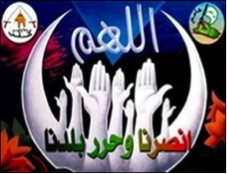
The image brings together a number of motifs designed to evoke a strong sense of Islamic identity in the beholder. The center motif is white hands raised in prayer to God jutting out of a white crescent moon. The moon in general plays a pivotal role within the Islamic tradition. It is laden with religious, astrological and spiritual significance and governs all daily life, as the Islamic calendar is a lunar one. In the narrower context of Islamic jihadi ideology, the moon is typically combined with other images that signal notions of righteousness, afterlife and martyrdom. Even more than the image of a full moon, the image of a white crescent moon constitutes an overt symbol of Islamic identity that highlights notions of purity and religious piety. The white also evokes the notion of death since It is the color of grief, mourning and shrouds. White hands are associated with potency, power and authority, as they typically evoke the Qur’anic stories surrounding the “white hand of Moses” that carries out miracles (see, e.g., Qur’anic verses 20:22, 26:33, 28:32). Here, the hands are set against a black background, surrounded by representations of flowers, topped with a blue sky and triangular ray of light ascending from the hands to the heavens. Flowers in general represent vitality, as well as life and its incessant pace, and thus are intended to evoke notions of afterlife, paradise and martyrdom (especially in the context of jihadi imagery). Red flowers or roses lack the purity of white ones, but because they are linked to the vital force, passion and warlike qualities, they are symbolic of martyrdom by violent means.
The image also contains the logos of two groups. The logo in the top right corner is that of the Islamic Front for the Iraqi Resistance (al-Jabha el-Islamiya lil-Moqawama al-Iraqiya, or JAMI), while the logo in the top left corner belongs to JAMI’s military arm, Kata’ib Salah al-Din. An abstract stream of blood creates a bright red background for the Kata’ib Salah al-Din logo. Finally, the caption reads: “Allahuma, unsurna wa-harrir baladana” (“Oh God, render us victorious and liberate our country”).
 Skip to content
Skip to content
